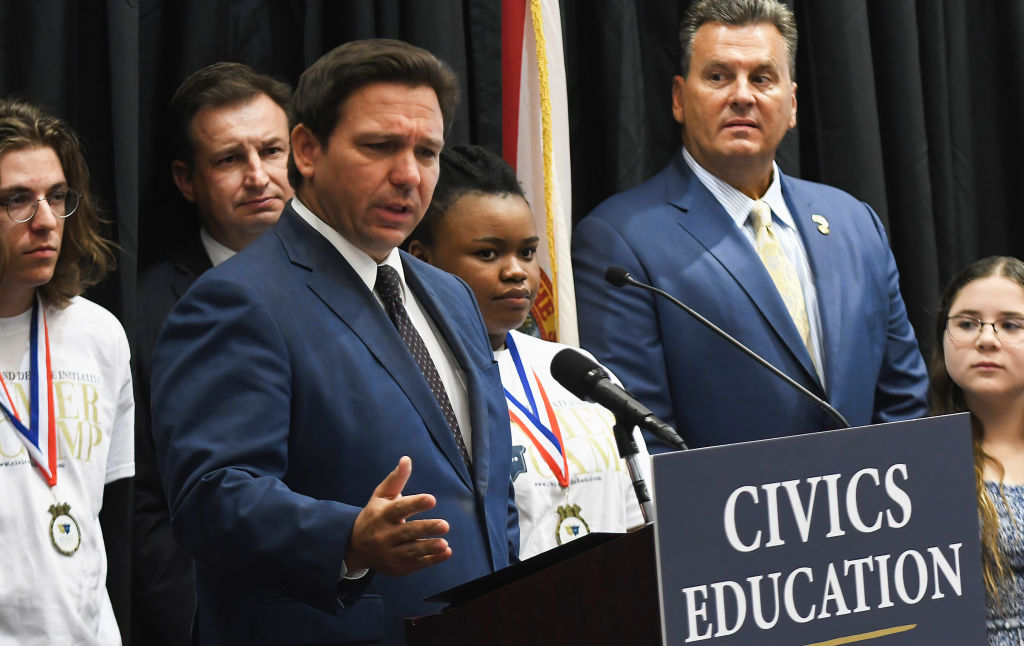Hey,
Let us return to what should be one of the simplest, most obvious, uncontroversial, and truly bipartisan ideas in all of politics (and business, sports, academia, law, cooking, murder-for-hire, and pretty much every field of human endeavor save perhaps for some niche and grotesque forms of pornography): Before you are given the opportunity and responsibility to do something very difficult, complicated, and risky, you should prove competency at easier, simpler, and less risky tasks.
As I wrote last summer:
If progressives really wanted to restore faith in government, they’d concentrate all of their energies on tackling the stuff already on the government’s plate. If you’ve ever been a boss or a manager, or frankly a coach, parent, mentor, teacher, or any other person in a supervisory or advisory role, you understand the basic principle. Want to climb Mount Everest? Show me you can climb some smaller mountains first. Want to be the starting forward on the basketball team? Show me you can be a great substitute player first. Want to be a professional boxer? Let’s see how you do as an amateur first. Do the job. Demonstrate basic proficiency. Execute the job you’ve been given well, and then we’ll talk about giving you more responsibility. Walk, then run, and then we’ll get into a fun argument about whether it’s stupid you think you can fly.
The reason I bring this up is I just finished recording a podcast with Princeton’s Keith Whittington where we briefly discussed Florida Gov. Ron Desantis’ kiboshing of a proposed Advanced Placement course in African American Studies.
Folks know that I’m a DeSantis skeptic and occasional critic, but not a hater. I don’t think he’s a “smart Trump” and I don’t think he’s a Floridian Viktor Orbán. I don’t like his style of politics very much and I think he’s let that style overpower the substance, which I often agree with to one extent or another.
But let’s take DeSantis out of the equation for a moment. If you want to stipulate that his decision is cynical and utterly political, fine. It doesn’t change my point.
Why should there be an AP course in African American Studies in the first place?
Wait, don’t get angry (at least not yet). If your answer is that it’s very important to teach kids about black history, I’m with you. If you think it’s vital to teach about slavery, Jim Crow, and the civil rights movement, I couldn’t agree more.
But you know who else agrees with us? The designers of the AP U.S. History test. Such themes are a major component of AP U.S. History courses. Just search for terms like “slavery,” “race,” “Jim Crow,” “civil rights,” etc. in these practice tests. Rather than drown you in excerpts, I’ll just state an obvious fact: If you aren’t very knowledgeable about this stuff, you shouldn’t take an AP U.S. History test and expect to do anything other than bomb.
Of course, not everyone takes AP classes or tests. But do not let your heart be troubled by the worry that regular students aren’t being taught about such topics. Slavery and civil rights are major parts of the standard curriculum, too. Not just in history but social studies as well.
In fact, if you read the College Board’s materials on the African American Studies AP course, you’ll find some intriguing data points. According to extensive research, the “top three historical developments represented on high school syllabi” were the transatlantic slave trade, American slavery, and the civil rights movement.
“Interestingly,” the authors write, “in student focus groups, participants expressed a strong desire not to delve deeply into slavery because this is the one topic they feel has been covered extensively and is traumatic.” They continue:
While we know we cannot have an African Americans studies course in which slavery is absent, this feedback indicates that the AP course should endeavor to expand student understanding and not repeat instruction students have already encountered.
That said, the materials mention slavery a lot anyway. See for yourself.
Heck, even the extremely contentious “Stop WOKE Act,” for all its flaws, real and alleged, actually requires teaching “the history of African Americans, including the history of African peoples before the political conflicts that led to the development of slavery, the passage to America, the enslavement experience, abolition, and the history and contributions of African Americans of the African diaspora to society.”
So when Rep. Jamaal Bowman says “Rom [sic] DeSantis wants to ban our history” by nixing this AP course as currently proposed, he’s overstating the case more than a little.
Indeed, a lot of folks seem to think that not supporting a new AP course is tantamount to “banning black history” or the teaching of it. Florida legislator Shevrin Jones goes so far as to claim, “This political extremism and its attack of Black History and Black people, is going to create an entire generation of Black children who won’t be able to see themselves reflected at all within their own education or in their own State.”
But wait a second. This course wasn’t being taught yet, except in one pilot program in one Florida school. So he’s not really removing anything from the existing curriculum. Were black kids unable to “see themselves reflected at all within their own education or in their own State,” say, last week? Jones is black and he works for the state. Was he invisible until this test program was unrolled?
This is a massive Motte-and-Bailey argument. The original idea was to teach African American Studies as an AP course as an additional offering amid all of the pre-existing courses that include black history. But when the proposal meets opposition, the response is essentially, “All we want is to teach black history!”
If the College Board proposed a new AP course in Jewish studies or Soviet history or molecular gastronomy and DeSantis said, “Yeah, we won’t be doing that” it would be fine to object to the decision. But it would be a stretch to say he was trying to “erase” Jewish history or ban the study of the Bolshevik Revolution.
Back to my point. I think there is, in fact, a lot of ideological indoctrination in this African American Studies framework. There’s a lot of intersectionality jargon that sets off red flags for me. It’s not all mumbo-jumbo or nonsense. But there’s no getting around the fact that it’s full of all sorts of left-wing framings and assumptions. It seems of a piece with the Howard Zinn school of American history: Drown kids in reasons to think they should be angry and ashamed of their country.
But let me just concede, for argument’s sake at least, that it’s all valuable and important stuff, entirely defensible on its own terms, appropriate for high school students. Let me also stipulate that in a perfect world, fluency in “Black Queer Studies” would be a meaningful part of every high school and college education (I want to be clear: This is not my position, I’m closer to Stanley Kurtz on all of this. But I’m open to being persuaded off my view).
I still have to ask, Is this really the best use of anyone’s time?
I mean are American high schools doing such a bang-up job on the stuff that everyone agrees they should be doing—teaching basic math and science, English, American history (including black history), and rudimentary civics—that teachers, administrators, and students alike have the extra bandwidth to tackle this stuff?
The most recent “report card” on American education was a disaster. From the New York Times last October:
In math, the results were especially devastating, representing the steepest declines ever recorded on the National Assessment of Educational Progress, known as the nation’s report card, which tests a broad sampling of fourth and eighth graders and dates to the early 1990s.
In the test’s first results since the pandemic began, math scores for eighth graders fell in nearly every state. A meager 26 percent of eighth graders were proficient, down from 34 percent in 2019.
Fourth graders fared only slightly better, with declines in 41 states. Just 36 percent of fourth graders were proficient in math, down from 41 percent.
Of course, the drastic decline was fueled by the pandemic and the school closures largely forced by teachers’ unions. But whatever the cause of the decline, the takeaway from people concerned with education might reasonably be, “let’s refocus on the basics.”
Colleges and universities spend billions of dollars on remedial math and English courses intended to make up for the failure of high schools to make students who go to college minimally proficient (the estimates I’ve seen range from just over $1 billion to $7 billion). A quarter of college freshmen take at least one remedial class.
Now, there’s a somewhat plausible-at-the-margins argument that remedial education is actually a waste of time and resources. So let’s forget teaching the three R’s, high schools have a massive problem with attendance. In 2015-2016, 15 percent of all students were chronically absent. In 2021 high school graduation rates fell for the first time in decades.
I don’t entirely trust statistics about illiteracy, but according to estimates conducted by, among others, the U.S. Department of Education, more than half of Americans (54 percent) read at the sixth-grade reading level. The widely accepted number is that 79 percent of Americans have a “medium” literacy rate.
We spend a lot of money on educating kids. As of 2019, the federal government spends $60 billion per year on K-12 education. States kick in $357 billion, and local governments contribute $347 billion. That comes to about 13 grand and change per student. This was before the hundreds of billions Biden dropped on pre-K and schools in Build Back Better.
Are we getting a great return on that investment?
The Peter Principle is the management theory that people rise to their “level of respective incompetence.” Basically, people good at their jobs get promoted to new jobs until they don’t know what they’re doing and then they plateau there.
Large swaths of the education industrial complex, turn the Peter Principle on its head. Yes, there are many great, sincere, hardworking teachers out there. But at the systemic level, it’s hard to avoid the conclusion that people, particularly administrators, get promoted without any consideration of competence whatsoever.
If schools were churning out literate, well-educated kids, not just among the minority who even go to college at all, but among the majority who don’t, I’d be like, “Tell me more about this African-American Studies idea.” But that’s not the situation we’re in, now is it?







Please note that we at The Dispatch hold ourselves, our work, and our commenters to a higher standard than other places on the internet. We welcome comments that foster genuine debate or discussion—including comments critical of us or our work—but responses that include ad hominem attacks on fellow Dispatch members or are intended to stoke fear and anger may be moderated.
With your membership, you only have the ability to comment on The Morning Dispatch articles. Consider upgrading to join the conversation everywhere.